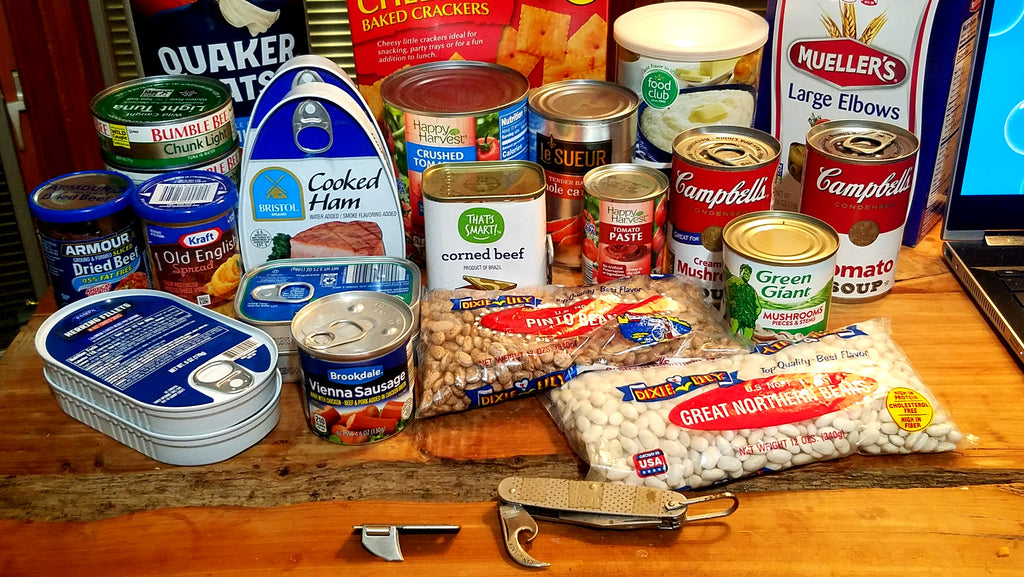July 08, 2020
Many of us remember this phrase fondly from our youth. We did our best to do it back then, and we work even harder to carry that philosophy forward with us as we grow through adulthood where our lives become so much more complex. It's often hard to even fathom the logic of the events much less try to prepare for all of them, but we try. We plan for the basics, and shoot for some of the contingencies at any rate. We need to be punctual to our events, able to pay our way, able to take or give notes or directions, light up a dark space, create warmth in the cold, and of course open packages or cut anything that needs cutting. And if, like me, you happen to enjoy picnics with someone special, a cork screw can really come in handy and save the time of performing a no glass /no cork bits wine-bottle-opening. Which can be done, and one method featured in an earlier article here a few years ago.

I have never identified myself as a prepper, I'm actually more a student of adaptation and improvisation, but I have some understanding of it as my Marine father and Head Cashier mother raised me in that type of lifestyle starting at age 6. It was in 1971 during the height of the cold war, and long before the term prepping was in vogue. Dad was 8 years older than mom, and had grown up during the great depression before joining the Marines. So he was more knowledgeable of hunting and fishing, and of surviving in a hard world in general. But mom had her own areas where she was sharp in my early childhood. She grew up on a farm and could raise a mean garden, and with the dented cans selling for half price at Kroger back in the 70s, she would cherry pick our favorites from the dented can displays before the store opened in the mornings.
Looking back I'm sure she, along with other people of course, dented a few cans herself. That's likely why that discount went away, but in '71 and '72 at any rate we had an impressive stockpile of canned goods and dry groceries. It was stored in sealed buckets, out of sight in a reinforced room under the basement stairs. The same room we hid in during bomb drills at home. The general rule with the food was an emphasis on items that could mix/go well with each other, and in combinations that varied in difficulty of preparation depending on the situation at hand. While I much prefer fresh fruits veggies and meats, I still keep a decent stock of canned and dry goods in the pantry to fall back on just because of the longer shelf life, and because stuff does happen. I also still have a collection of can openers because not all cans have pull tabs or keyed entry.

My earliest wilderness skills were simple ones. The biggest were being able to find my way to and from the various fishing and swimming holes and rabbit hunting clearings we frequented, and the stands of nut trees where we squirrel hunted. Some of which were more than just a few miles through the woods of the Tennessee hills, where I was born and now live again. And of course in being prepared to clean, process, and transport the fish or game home. Needless to say I was pretty thrilled when ziploc bags came along. To this day I still almost always carry a knife and a small compass just out of a decades long habit.

After the divorce, when I was 8, Dad and I moved to Florida. As I grew older the lessons became more complex. The advanced lessons in coastal survival when I was 10 through 12 were my favorites. The environment was often hot abrasive and swarming with mosquitoes so I bled a lot for different reasons, there were a lot of details to remember, and some of the work like tying nets for catching fish shrimp and crabs was pretty tedious. But with my love of seafood the payoff in the evenings was totally worth it. Some of the main lessons I learned there were; fish and crustaceans are usually a lot easier to catch than small game or fowl, and that stainless steel and nonferrous metals are great to have in a saltwater environment versus high carbon steels. More than forty years later I still prefer stainless steel knife blades, and I still keep a small fishing kit and cordage to work with in my pack.

Another level of preparedness Dad taught me as a way of life were lessons in home economics, and those were based on instances of him seeing people going hungry in his childhood and not eating for days. There were many lessons in being able to stretch foods further, so we would always be prepared to provide meals for an extra guest or two if our neighbors were ever hungry for any reason. It was something deeply personal to him. In fact every weekend we went fishing we would have a cookout and invite all of our neighbors over for fresh fish. It became a tradition that dad and I would catch clean and cook the fish, and the neighbors would bring the sides. Those were my favorite days of my childhood. Among the foods he taught me how to stretch are the layered biscuits you see above. By separating the layers differently than intended an extra biscuit or two can be made from each tube. A little thinner and not as filling perhaps, but much more nourishing for the spirit and morale than an empty stomach. Quelling hunger in a rough patch fuels hope, and that's one one of my earliest life lessons.

The above scene is a contrived illustration of one of the lessons I learned one day last year. If the star of your world just happens to like lime in her cerveza with her Mexican cuisine, it can be a good idea to be prepared to split the lime into two smaller pieces. Just in case the provided slice is too thick to get into the bottle, it does happen.

I think perhaps the of the most poignant lessons I've learned on the subject of preparation for life in a confusingly unpredictable mad world, has nothing to do with anything tangible being brought to a table other than an attitude, and actually has more to do with being able to leave something behind elsewhere on the way. And that is in being prepared to just to let go of the day's stresses and worries for a while and not let them rule our day. So we can take the time to truly appreciate the few wonderful moments we are blessed with in life as they deserve. Just in case the opportunity to do it again and get it right never comes.
Though sometimes we think otherwise, we're not the only ones who have a say in when the sand in our cosmic hour glass stops falling. Even on the days we get to see the sunrise, seeing the sunset is never guaranteed, much less the sunrise the following day. Living my days as if each will be my last has become somewhat habitual for me after all the close calls, and I'm very glad for that. It helps me get more appreciation out of every minute when I can avoid taking them for granted. We all know one of our minutes will the last, so I think it's a good idea to make as many of them count for something as we can along the way.
Comments will be approved before showing up.
Frequently Asked Questions
Product Warranty Information
Returns & Exchanges
Shipping Policy
Terms & Conditions
Privacy Policy
Contact Us
Search
Sign up to get the latest on sales, new releases and more…
Fiddleback Forge
5405 Buford Hwy Ste 480
District Leather Bldg
Norcross, GA 30071
© 2026 Fiddleback Forge.
Fiddleback Forge brand name and Logo are registered trademarks of Fiddleback Forge, Inc. All rights reserved.
